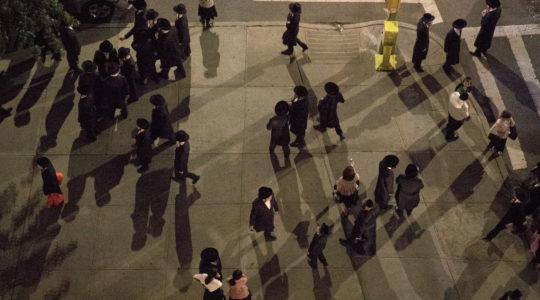When John Ruskay, the executive vice president and CEO of UJA-Federation of New York, receives an honorary doctorate at the Jewish Theological Seminary this week it will be a homecoming of sorts for him. Ruskay, 64, was a rabbinical student at JTS for a year after graduating from college in 1968, and served for eight years as vice chancellor (the first non-rabbi to do so) from l985-l993.
In a rare moment of quiet for the busy executive, he reflected on his seminary days, his personal Jewish journey and career in communal life.
Q: What was your experience like as a student at the seminary?
A: Having been a product of the social and political turmoil of the ‘60s, I suppose — retrospectively — I was seeking to become a clergyman on the model of Dr. [Martin Luther] King, Rabbi Abraham Joshua Heschel and Rev. William Sloane Coffin [the Yale University chaplain and peace activist]. And they [the JTS officials], understandably, wanted me to become a rabbi. I wanted to study about life, death, community and meaning. They felt I needed first to master traditional texts. Having said this, my year at the seminary was fabulous. I studied with excellent teachers, and as part of my training I was assigned as a kind of secretary/administrative assistant to Rabbi Heschel and met with him twice a week
Just seeing figures like Heschel, [Talmud professor] Rabbi Saul Lieberman, [Talmud professor and JTS chancellor] Rabbi Louis Finkelstein and [rabbinic literature] professor [Henry Louis] Ginsberg walking around the campus conveyed a depth of Jewish learning, yet engagement within life that has stayed with me. It was at times intimidating, but it was a privilege.
At what point did you first become interested in Jewish life on a personal level?
Camp Ramah, the summer camp of the Conservative movement, changed my life. I was 13. Having not been raised in a religious home, I found the experience of Shabbat at camp extraordinary. It seared my soul. I went on to spend four summers as a camper there, became a national officer of USY (United Synagogue Youth), made my first trip to Israel in 1963, when I was in high school, and came back to Ramah as a staffer in 1975.
Was there a specific moment when you realized you wanted to work for the Jewish community as a professional?
Two things happened. In 1971, I went to the concentration camp at Dachau with my parents. It was a time when I was struggling with my identity, and I remember staring at the ovens of the crematorium and realizing that, if circumstances had been different, I would have been in those ovens. From that moment on, I embraced being a Jew as a point of personal departure.
My challenge then was: how to shape it personally? And how to help create more engaging, more compelling Jewish life?
And a decade later, I was studying with my friend and chavruta [study partner] Richie Siegel, and was introduced to the power of studying Jewish text. I hadn’t been ready for such intensive joy when I was younger.
How does your career in Jewish communal life reflect your personal views?
Support the New York Jewish Week
Our nonprofit newsroom depends on readers like you. Make a donation now to support independent Jewish journalism in New York.
My work with federation has, in a sense, helped connect me back to my family. My parents were involved with civil rights causes and caring for the poor. Federation connected me to helping people who are left out of the bounty so many of us enjoy.
My work at UJA-Federation is about providing large numbers of our community with experiences that are engaging and compelling, actualizing our tradition’s commitment to treat every human as if they are created in the image of God, and deepening awareness that we are part of a global people that share history and destiny.
Among the many issues you deal, which do you think needs more attention today?
We as a community need to renew Zionist education, an issue we’ve neglected, and we are seeing some of the results with younger people now. We are not well served by conflating Israel advocacy and Israel education. Since 1948 we’ve asked people to rally for Israel, and they did. But we didn’t provide the educational frameworks that would allow them to grapple with the challenge of developing their own vision of what Israel can and should be, and working through tough issues. For ultimately, such a process strengthens connection and commitment.
Too many in our community, young and old, are intellectually naked when it comes to the complexity of contemporary Zionist education, and these include many of our future professional and lay leaders. This requires urgent focus.
The New York Jewish Week brings you the stories behind the headlines, keeping you connected to Jewish life in New York. Help sustain the reporting you trust by donating today.




